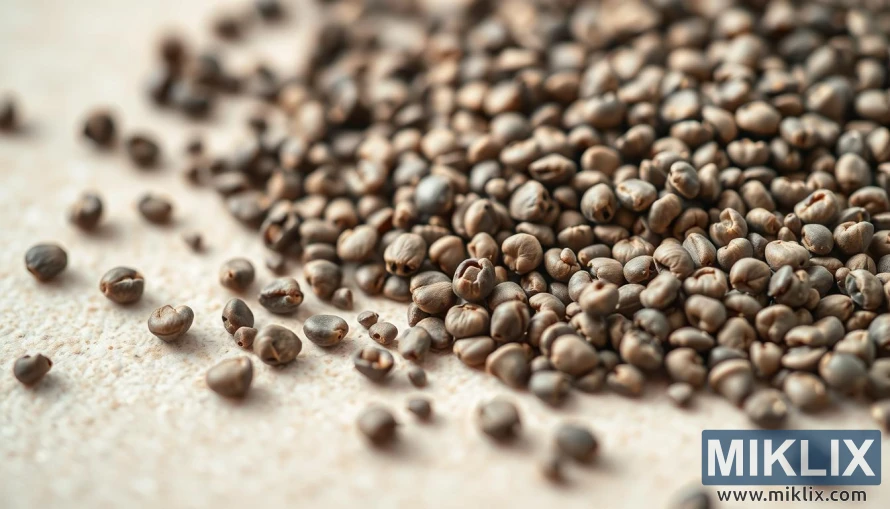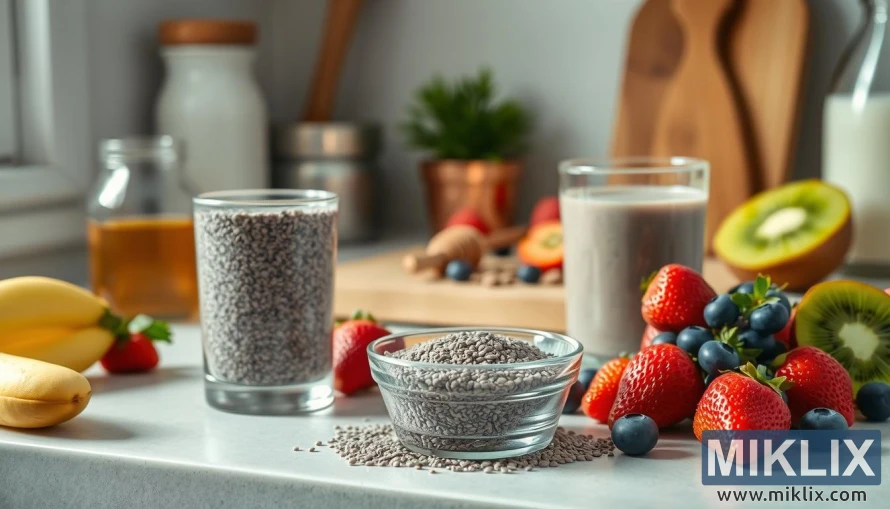Small But Mighty: Unlocking the Health Perks of Chia Seeds
Published: May 12, 2025 at 8:06:55 PM UTC
Last updated: December 26, 2025 at 11:11:02 AM UTC
Chia seeds are a trendy superfood, loved for their unique texture and health perks. They come from the Aztec and Maya civilizations. Now, they're known worldwide for their nutritional value. These small seeds are full of fiber, protein, and antioxidants. They're a great addition to any diet. This article explores the health benefits of chia seeds. It shows how they can help with weight loss, heart health, and more.

Key Takeaways
- Chia seeds are a rich source of essential nutrients.
- They are known for their significant health benefits, including support for heart and bone health.
- The high fiber content in chia seeds may aid in weight management.
- Rich in antioxidants, chia seeds help combat oxidative stress in the body.
- They offer versatility, making them easy to incorporate into various diets.
Introduction to Chia Seeds
Chia seeds are now known as a superfood because of their health benefits. These small seeds are black or white and come from the Salvia hispanica plant. This plant is from Central America.
The Aztecs and Mayans used chia seeds long ago. They ate them for nutrition and health. Today, people are interested in chia seeds for their health benefits.
Chia seeds are popular because they are full of nutrients. They have omega-3 fatty acids, fiber, and protein. This makes them a favorite in the wellness world.
Highly Nutritious Profile of Chia Seeds
Chia seeds are packed with nutrients, making them a tiny but mighty food. One ounce (28 grams) has about 138 calories, giving you a lot of energy. They also have 4.7 grams of protein per serving.
The fat in chia seeds is mostly good omega-3 fatty acids, with 8.7 grams. These fats are great for your heart and help reduce inflammation. Chia seeds also have 11.9 grams of carbs and 9.8 grams of fiber. This fiber is about 35% of your daily value, helping with digestion and keeping you full longer.
Chia seeds are not just about macronutrients; they're also full of minerals. A serving gives you about 14% of your daily calcium, 12% of iron, 23% of magnesium, and 12% of zinc. Adding chia seeds to your diet boosts your nutrition and supports your body's functions.

Loaded with Antioxidants
Chia seeds are packed with antioxidants. They have compounds like chlorogenic acid and caffeic acid. These antioxidants in chia seeds help protect the body from damage.
Antioxidants are known for fighting free radicals. Free radicals can harm cells, leading to aging and diseases. Eating chia seeds helps protect against these harmful molecules.
These antioxidants do more than just protect fats in chia seeds. Studies show they might lower blood pressure and reduce inflammation. Adding chia seeds to your diet can boost your health.
Potential for Weight Loss
Chia seeds are popular for their role in weight management. They are packed with dietary fiber, which helps with weight loss. The fiber in chia seeds expands in the stomach, making you feel full and reducing calorie intake.
Research shows that dietary fiber helps control hunger. Eating foods high in fiber, like chia seeds, can lead to lower body weight. For example, a study found that people who ate chia seeds with yogurt felt fuller and ate fewer calories.
Adding chia seeds to your diet is a simple way to manage weight. You can mix them into smoothies, oatmeal, or baked goods. This makes them a great choice for controlling hunger and staying healthy.
Chia Seeds May Lower Heart Disease Risk
Chia seeds are great for heart health. They have a lot of soluble fiber. This fiber helps lower cholesterol, which is good for your heart.
Chia seeds also have alpha-linolenic acid (ALA), a plant-based omega-3. Studies show ALA can help your heart and reduce inflammation.
Even though there aren't many human studies, animal research is promising. Rat studies show that chia seeds can lower blood pressure and triglycerides. This means they might help prevent heart disease.
Bone Health Benefits of Chia Seeds
Chia seeds are becoming more popular for their role in bone health. They are small but full of important minerals like calcium and phosphorus. These minerals are key for strong bones.
Calcium helps keep bones dense, and phosphorus is important for bone mineralization. Chia seeds also have magnesium, which helps with bone structure. They contain alpha-linolenic acid (ALA), which might boost bone health by increasing mineral content.

Even though more studies are needed, chia seeds are great for a diet focused on bone strength. Their mineral-rich profile makes them a valuable addition.
Blood Sugar Regulation with Chia Seeds
Chia seeds might help control blood sugar levels. They are packed with fiber and special compounds. Studies show that eating chia seeds can make your body more sensitive to insulin, which is key for diabetes management.
These tiny seeds could also keep blood sugar stable after eating. Animal studies have shown positive effects on blood sugar spikes after meals. Also, older research found that chia seed bread can improve blood sugar levels in healthy people.
Chia Seeds and Digestive Health
Chia seeds are great for your digestive health because they are full of fiber. This fiber helps you have regular bowel movements, which is key for a healthy gut. When you eat chia seeds, they swell in your stomach. This makes you feel full and helps with digestion.
Chia seeds also keep your gut bacteria in balance. A healthy balance of gut bacteria is linked to better digestion and less risk of stomach problems. Adding chia seeds to your diet can help grow good bacteria in your gut, leading to more health benefits.
But chia seeds do more than just help with digestion. They can also lower the risk of serious diseases like heart disease and diabetes. They reduce inflammation in your digestive system. If you want to boost your digestive health naturally, chia seeds are a great choice for your meals and snacks.
Versatile Use of Chia Seeds in Diet
Chia seeds are great for adding nutrition to your meals. They can make any dish healthier and tastier. You can eat them raw, which adds a nice crunch to salads and yogurt.

Soaking chia seeds in liquid makes them gel-like, perfect for puddings or smoothies. Their mild taste lets them blend well into many dishes. This makes them great for:
- Baked goods like muffins and bread, adding moisture.
- Vegan recipes, as an egg substitute for binding.
- Soups and sauces, thickening them up.
There are many chia seed recipes out there, fitting different diets. Sprinkle them on oatmeal or mix into smoothies. Chia seeds are easy to add to any meal. They boost health and add variety to your cooking.
Potential Side Effects of Chia Seeds
Chia seeds are a superfood loved for their health benefits. But, they might not be good for everyone. Some people might get digestive problems like gas, bloating, or diarrhea. To avoid these, it's important to slowly add more fiber and drink plenty of water.
People with allergies or sensitivities should be careful with chia seeds. An allergy can cause mild to severe reactions. Knowing your health before eating chia seeds is key to staying safe. This way, you can enjoy chia seeds without worrying about allergies or digestive issues.
Chia Seeds as a Source of Protein
Chia seeds are a great source of plant-based protein, with about 4.7 grams per ounce. They are perfect for those who follow a vegetarian or vegan diet. Chia seeds have all nine essential amino acids, making them a high-quality protein option.
Adding chia seeds to your meals can help meet your daily protein needs. They are easy to add to smoothies, oatmeal, or baked goods. But remember, chia seeds should not be the only protein you eat. A balanced diet is essential for getting enough protein.
Environmental Impact and Sustainability of Chia Seed Farming
Chia seed farming is becoming more popular because it's good for the environment. These seeds need much less water and fewer chemicals than other crops. This makes them a great choice for farming in a way that's kind to the planet.
Farmers are now using methods that help the environment. They make sure growing chia doesn't hurt nature. This is important for keeping our ecosystems healthy.
The growing need for chia seeds means we have to think about how they're made. Using sustainable farming is key to reducing harm. Techniques like rotating crops, organic farming, and using fewer pesticides help a lot.

Even though chia seeds are good, we can't keep taking too much of them. It's important for people to choose brands that care about the environment. By doing this, we help keep this beneficial crop safe for the future.
Conclusion
Chia seeds are tiny superfoods that offer big health benefits. They are full of essential fatty acids, protein, and fiber. These nutrients help support heart health, aid in weight loss, and improve blood sugar and digestive health.
Research supports the health benefits of chia seeds. Adding them to your diet can lead to better health. They are easy to use in many meals, making them a great choice for improving nutrition.
Choosing chia seeds helps you reach your health goals and supports sustainable farming. They are simple to add to your daily meals. This way, you can enjoy their many benefits and make your meals healthier.
Further Reading
If you enjoyed this post, you may also like these suggestions:
- Tropical Treasure: Unlocking the Healing Powers of Coconuts
- Olives and Olive Oil: The Mediterranean Secret to Longevity
- The Carnosine Catalyst: Unlocking Muscle Performance with Beta-Alanine
